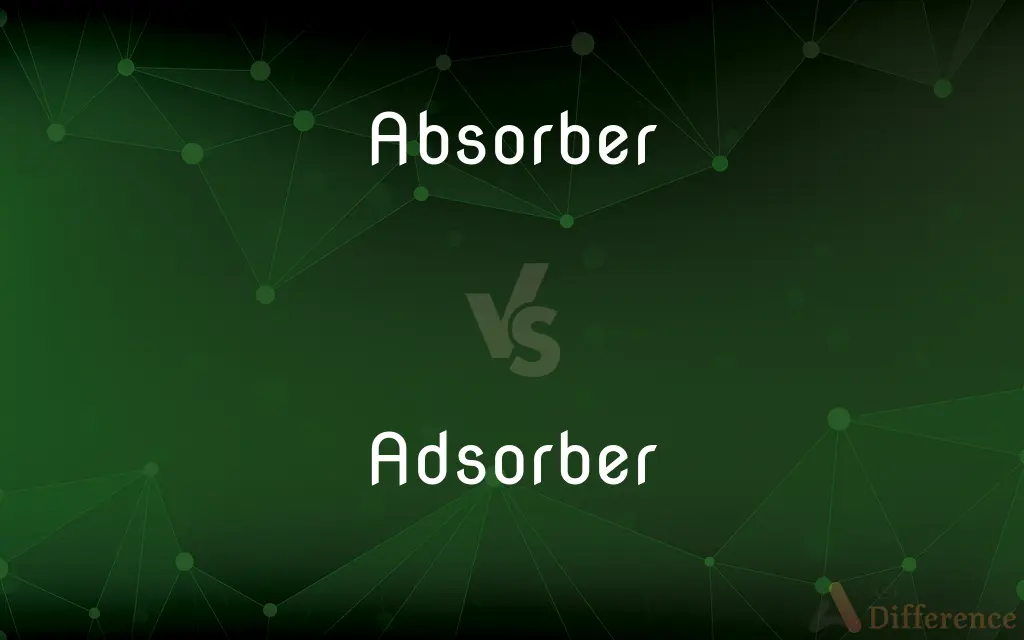Absorber vs. Adsorber — What's the Difference?
By Tayyaba Rehman & Urooj Arif — Updated on April 21, 2024
Absorbers capture gases or liquids within their bulk, while adsorbers trap substances on their surface.

Difference Between Absorber and Adsorber
Table of Contents
ADVERTISEMENT
Key Differences
Absorbers involve the intake of one substance into another, such as a sponge absorbing water. In contrast, adsorbers collect molecules on their surface without incorporation, like charcoal adsorbing odors from air.
An absorber is commonly used in processes where dissolution or chemical reactions are desired, as in gas scrubbers. On the other hand, adsorbers are ideal for surface-based filtration, such as in air purifiers or water filters.
The efficiency of an absorber depends on the solubility and reactivity of the absorbed substance within the medium. Whereas, the effectiveness of an adsorber relies on the surface area and the physical or chemical properties that allow it to capture particles or gases.
Maintenance of absorbers often involves handling the entire medium saturated with the absorbed material, which might require regeneration or disposal. Conversely, adsorbers usually need periodic replacement of the adsorbent material as its surface becomes saturated.
In industrial applications, absorbers are key in systems like CO2 capture from power plants where gases are absorbed into a liquid. Adsorbers are more commonly used in catalytic converters or pollution control systems where pollutants are trapped on solid surfaces.
ADVERTISEMENT
Comparison Chart
Function
Captures substances within its bulk
Captures substances on its surface
Common Uses
Chemical processing, gas scrubbers
Air purifiers, water filters
Dependence
Solubility and reactivity of substances
Surface area and physical/chemical properties
Maintenance
Requires handling saturated medium
Needs replacement of material as it saturates
Industrial Example
CO2 capture systems
Catalytic converters, pollution control
Compare with Definitions
Absorber
A device or substance that takes in and retains another substance within its bulk.
A sponge is an absorber of water.
Adsorber
Primarily used for purification and separation.
Water treatment facilities use adsorbers to clean water.
Absorber
Utilized to reduce or eliminate the presence of unwanted gases or liquids.
Industrial absorbers help remove toxins from emissions.
Adsorber
Plays a crucial role in environmental protection.
Adsorbers in vehicles capture harmful exhaust pollutants.
Absorber
Key in acoustics to reduce sound reflection.
Acoustic absorbers are used in studios to improve sound quality.
Adsorber
Utilized in personal protective equipment.
Gas masks contain adsorbers to filter out toxic gases.
Absorber
Can act in a biological context, like tissues absorbing nutrients.
The small intestine is an important nutrient absorber.
Adsorber
A device that accumulates substances on its surface without absorbing them.
A carbon filter is an effective chemical adsorber.
Absorber
Often involved in thermal systems to manage heat.
A heat absorber in refrigerators helps maintain low temperatures.
Adsorber
Often requires periodic regeneration to maintain efficiency.
Industrial adsorbers are regenerated with heat or chemicals.
Absorber
In high energy physics experiments, an absorber is a block of material used to absorb some of the energy of an incident particle. Absorbers can be made of a variety of materials, depending on the purpose; lead, tungsten and liquid hydrogen are common choices.
Adsorber
Something which adsorbs, especially a solid material, such as activated carbon, that has a high surface area and is used to capture a gas or liquid
Absorber
To take (something) in through or as through pores or interstices.
Absorber
To occupy the attention, interest, or time of; engross
The problem completely absorbed her.
Absorber
To take up or occupy (one's time or interest, for example).
Absorber
To retain (radiation or sound, for example) wholly, without reflection or transmission.
Absorber
To take in; assimilate
Immigrants who were absorbed into the social mainstream.
Absorber
To learn; acquire
"Matisse absorbed the lesson and added to it a new language of color" (Peter Plagen).
Absorber
To receive (an impulse) without echo or recoil
A fabric that absorbs sound.
A bumper that absorbs impact.
Absorber
To assume or pay for (a cost or costs).
Absorber
To endure; accommodate
Couldn't absorb the additional hardships.
Absorber
To use up; consume
The project has absorbed all of our department's resources.
Absorber
Something that absorbs.
Absorber
A device which causes gas or vapor to be absorbed by a liquid.
Absorber
(nuclear physics) A material that absorbs neutrons in a reactor.
Absorber
A person who absorbs.
Absorber
One who, or that which, absorbs.
Absorber
(physics) material in a nuclear reactor that absorbs radiation
Common Curiosities
How do absorbers differ from adsorbers in usage?
Absorbers are used where complete integration of substances is needed, while adsorbers are ideal for surface-level capture and filtration.
Are absorbers effective in sound management?
Yes, absorbers are very effective in managing acoustics by reducing echo and reverb in spaces.
What is an absorber?
An absorber is a device or material that intakes and incorporates substances into its bulk.
Can an absorber be regenerated like an adsorber?
Absorbers can sometimes be regenerated, but the process often involves more complex steps compared to adsorbers.
What industries commonly use adsorbers?
Industries related to air and water purification, chemical processing, and pollution control frequently use adsorbers.
What materials are commonly used as adsorbers?
Activated carbon, zeolites, and silica gel are common materials used for adsorption.
What is an adsorber?
An adsorber is a device that binds substances to its surface without incorporating them internally.
Can adsorbers be used in medical applications?
Yes, adsorbers are used in medical applications such as in hemoperfusion where toxins are removed from blood.
Why are adsorbers important in environmental engineering?
They play a crucial role in removing pollutants from air and water, thereby protecting the environment.
What is a common example of an adsorber in everyday life?
Air purifiers in homes often use HEPA filters, which act as adsorbers to clean the air.
How do absorbers work in gas scrubbers?
In gas scrubbers, absorbers capture harmful gases into a liquid solution, effectively removing them from air streams.
What are some applications of absorbers in chemical industries?
Absorbers are used to capture and neutralize chemical emissions in processes like acid gas removal.
Are there environmental concerns associated with absorbers?
Disposal or regeneration of saturated absorbers can pose environmental challenges, requiring careful management.
How does the surface area affect an adsorber’s efficiency?
Larger surface areas provide more space for adsorption, increasing the efficiency of the adsorber.
What is a key consideration when designing an absorber system?
One must consider the chemical compatibility and capacity of the absorber medium with the target substance.
Share Your Discovery

Previous Comparison
Heracles vs. Hercules
Next Comparison
Key vs. PivotalAuthor Spotlight
Written by
Tayyaba RehmanTayyaba Rehman is a distinguished writer, currently serving as a primary contributor to askdifference.com. As a researcher in semantics and etymology, Tayyaba's passion for the complexity of languages and their distinctions has found a perfect home on the platform. Tayyaba delves into the intricacies of language, distinguishing between commonly confused words and phrases, thereby providing clarity for readers worldwide.
Co-written by
Urooj ArifUrooj is a skilled content writer at Ask Difference, known for her exceptional ability to simplify complex topics into engaging and informative content. With a passion for research and a flair for clear, concise writing, she consistently delivers articles that resonate with our diverse audience.
















































